Ford F-Series fourth generation
Fourth generation
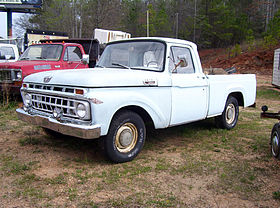
ManufacturerFord Motor Company
Also calledMercury M-Series
Production1961–1966
AssemblyCuautitlan, Mexico
Dearborn, Michigan, USA
Edison, New Jersey, USA
Kansas City, Missouri, USA
Long Beach, California, USA
Norfolk Assembly (Norfolk, Virginia, USA)
St. Paul, Minnesota, USA
St. Louis, Missouri, USA
General Pacheco, Argentina
Hapeville, Georgia, USA
Louisville, Kentucky, USA
San Jose, California, USA
Wayne, Michigan, USA
Lorain, Ohio, USA
Oakville, Ontario, Canada
Salisbury, Rhodesia (FMCR)
PredecessorFord F-Series third generation (1957-1960)
SuccessorFord F-Series fifth generation (1967-1972)
ClassFull-size pickup truck
Body style2-door pickup
4-door pickup
LayoutFront engine, rear-wheel drive / four-wheel drive
Engine223 CID (3.7 L) I6
292 CID (4.8 L) Y-block V8
240 CID (3.9 L) I6
300 CID (4.9 L) I6
352 CID (5.8 L) FE V8
Wheelbase115 inches (2,921 mm)[1]
The truck was completely redesigned for 1961 with a wider look; Ford also introduced a new style of truck. Unibody trucks, integrating the cab and the box, were produced from 1961 to 1963. From 1964 on, only the traditional separate cab and bed arrangement were available. Power was over 200 hp (150 kW) with the 1965 update of the powertrain. In 1965, the Twin I-Beam front suspension was introduced with coil springs. 1965 also marked the beginning of a completely different chassis; many parts from 1965-1979 interchange such as brakes and motor mounts. The 1965 and 1966 trucks have a "TWIN I-BEAM" emblem on the front fender. A 4-door crew cab version was also introduced in 1965, which would become a popular option. The Camper Special was built heavier for the slide in campers that were becoming increasingly popular during this time. Ford still offered a "Low GVWR" version of each model. In 1965, the Ranger name first appeared as a styling package for the F-Series pickup trucks. The interior featured bucket seats (from the Mustang) and a curtain over the gas tank which was behind the seats in the cab.
In 1965, the 300-cubic inch (4.9 L) straight six was introduced (a larger version of the 240-cubic inch Six). It had 7 main bearings and timing gears (no chain or belt). The 300 six would remain in the F-Series lineup until the end of the 1996 model year.
Models:'
- F-100 (F10, F11, F14): 1/2 ton (4,000–5,000 GVWR max)
- F-100 (F18, F19)(4×4): 1/2 ton (4,000–5,600 GVWR max)
- F-250 (F25): 3/4 ton (7,400 GVWR max)
- F-250 (F26)(4×4): 3/4 ton (4,900 GVWR max)
- F-350 (F35): 1 ton (9,800 GVWR max)
Engines: Note: HP in Net HP
EngineYearsPower
223 CID Mileage Maker I61961–64114 hp (85 kW)
262 CID Mileage Maker I61961–64132 hp (98 kW)
292 CID Y-block V81961–64135 hp (101 kW)
240 CID Straight-61965–66150 hp (110 kW)
300 CID Straight-61965–66170 hp (130 kW)
352 CID FE V81965–66172 hp (128 kW)

1961 Ford F-100 Pickup
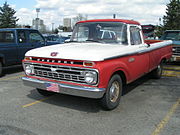
1966 Mercury M-100

1966 Mercury M-350 Tow Truck
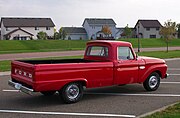
1966 Ford F-100 with optional toolbox in side of bed


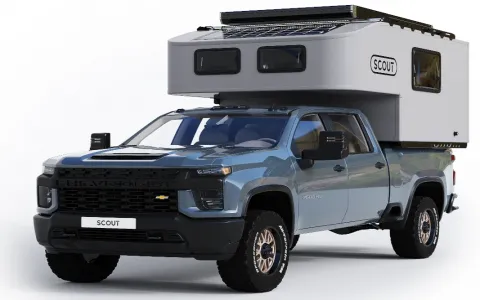
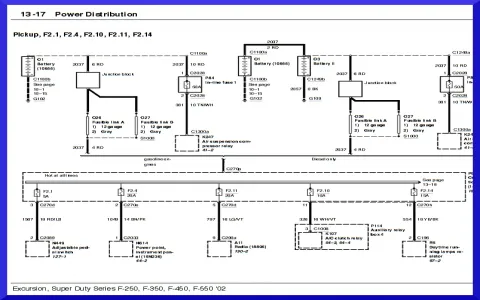


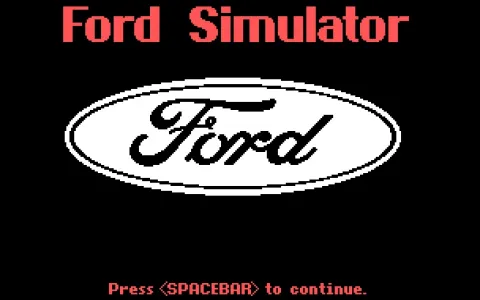
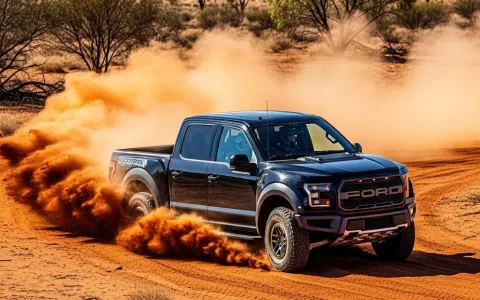
![What Ford F150 is Best for Towing ? [Full Guide]](/sites/default/files/styles/frontpage_stories/public/2025-04/f250-camping.webp?itok=6Ah370zB)
